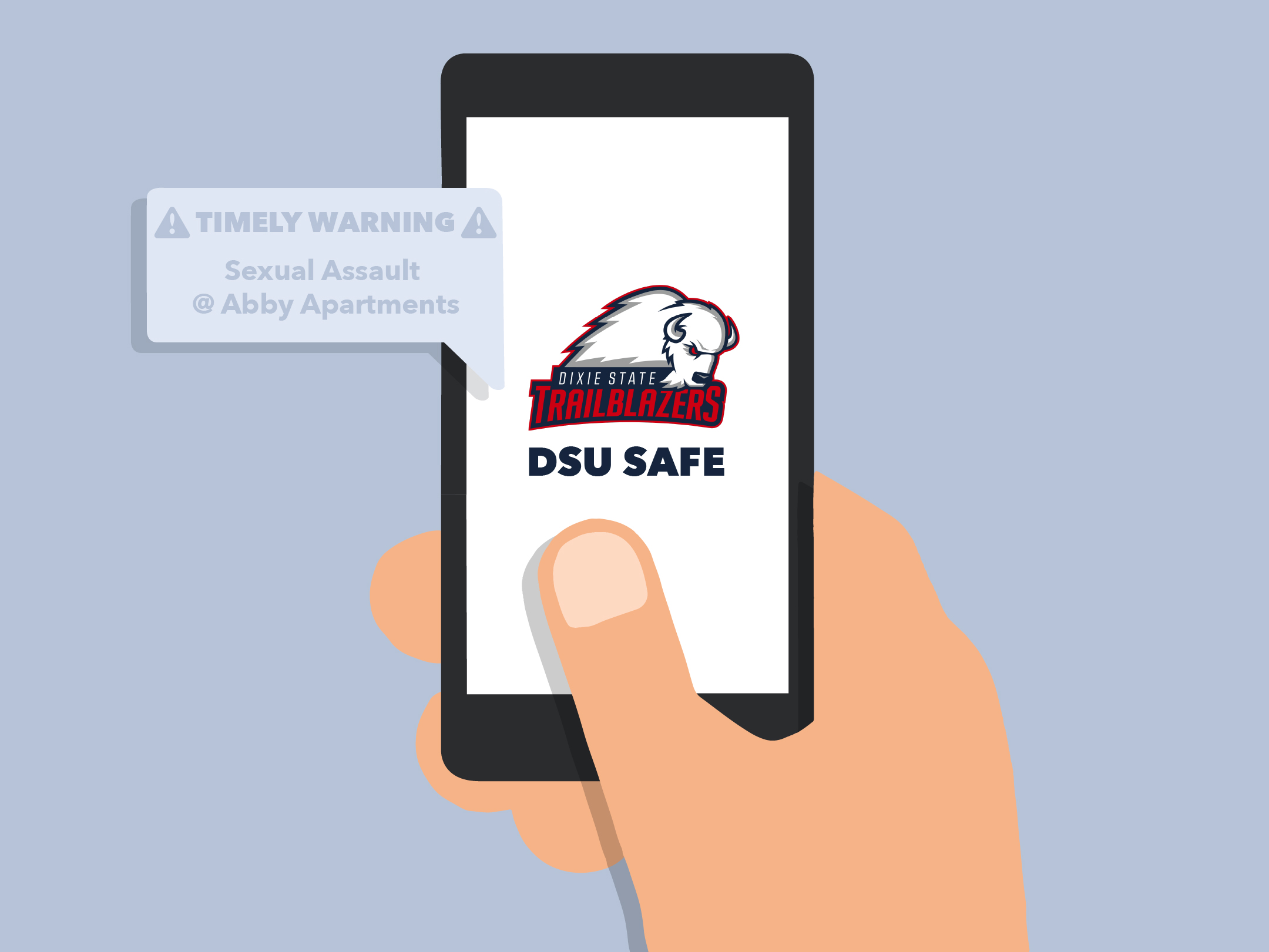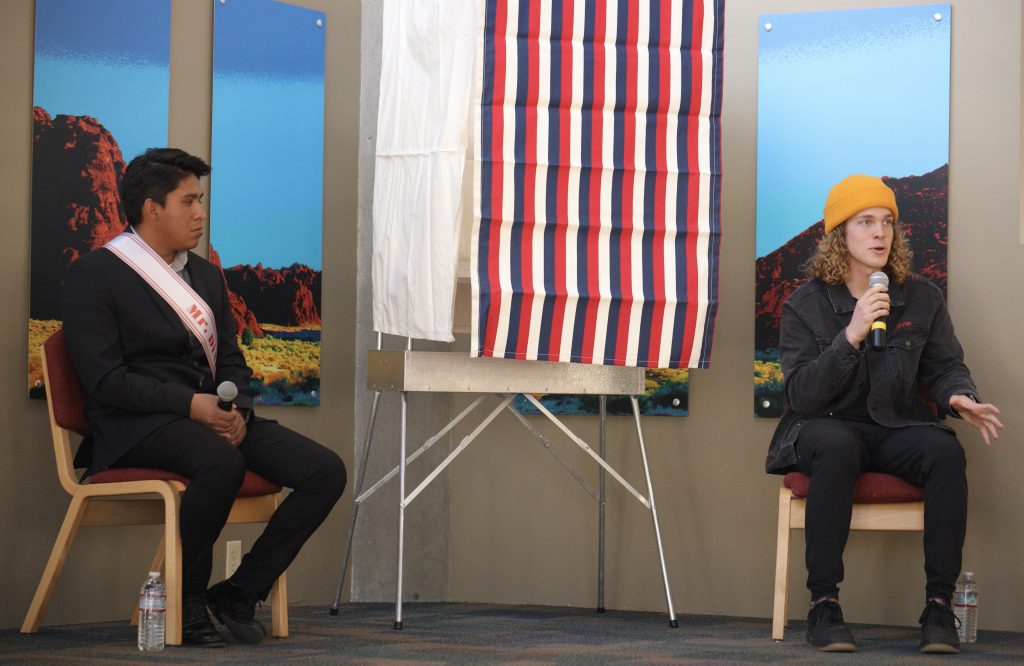Dixie State University spreads awareness after recent sexual assault allegations.
Thirteen percent of all students (graduate and undergraduate) will be sexually assaulted, and most sexual assaults are perpetrated by someone you know.
DSU Chief of Police Blair Barfuss reminds students to utilize the DSU Safe app.
The DSU Safe app includes useful features such as informing students about what resources are accessible to them and providing students with the ability to do a safe walk. The app has the ability to call 911, call police dispatch and contact security. Students may also make anonymous reports through the app.
“A safe walk sends a text notification to a friend, once that friend accepts it, the GPS locates you and you can watch somebody walking on campus in real-time,” said Barfuss. “You can also open the microphone in the app where you can also listen to what is going on.”
Barfuss said he wishes students were more aware of the DSU Safe app as it could keep DSU students safe from danger.
“The Safe app is essential to safety and security on campus,” Barfuss said.
Barfuss talked about the shift the campus police department has seen in sexual assault cases. Barfuss said in the past, students were too afraid to report sexual assault cases because they had been drinking alcohol and did not think they would be taken seriously.
Barfuss ensures all sexual assault cases will be taken seriously, which is why they have implemented new programs and positions to ensure survivors feel safe and are getting the support they need.
Barfuss said all campus police officers are now qualified to handle sexual assault cases whether they are reported anonymously or not.
Jamy Dahle, assistant director and outreach coordinator for the Booth Wellness Center, explained how DSU’s Booth Wellness Center can help survivors of sexual assault.
“The Booth Wellness Center provides therapy services for survivors of sexual assault; however, we generally attempt to connect individuals to providers who specialize in trauma treatment,” Dahle said.
Dahle said the Booth Wellness Center also provides students the resources they may want or need to report an incident if a survivor chooses to do so.
The Booth Wellness Center provides a list of tips to increase safety on campus:
- Make a plan: Let a friend or family member know who you are with, where you are going, and when you will be home and have an out.
- Make others earn your trust: Avoid secluded places. When meeting a person for the first time, a date, etc., meet in a public place – avoid being alone in your/their apartment.
- Protect your drink and know your limits: Do not leave your drink
unattended when in social gatherings, and be aware of the amount of any alcoholic beverages consumed. - Be a good friend: Trust your instincts, and if something doesn’t feel
right, speak up. - Seek out help: If you believe you have been sexually assaulted, seek out help.
- Be clear: Most importantly, remember to be clear about what is OK for you and know it is OK to say no. Consent is clear, coherent, willing and ongoing.
While DSU provides on-campus help for domestic and sexual abuse victims, St. George also has off-campus resources like the DOVE Center, Trauma help for Women, and Utah Coalition Against Sexual Assault. Another well-known domestic violence organization is SafeNest.
SafeNest is a Nevada-based non-profit domestic violence organization dedicated to ending domestic violence with its five main services: 24/7 crisis hotline, confidential emergency shelter (located in Las Vegas, Nevada), counseling, advocacy and prevention education.
The closest SafeNest organization is located in Mesquite, Nevada.
“If you believe anyone may be in an abusive relationship, the best thing you can do is tell them you love them and you are here for them,” CEO of SafeNest Liz Ortenburger said. “From then you can address the issue by saying you aren’t sure what is going on in their relationship, and if they can’t tell you what is going on directly it’s best to come up with a code word.”
Ortenburger said. “It is so that survivors are able to stay empowered to leave whenever they feel it is right. If we tell someone to leave their relationship, we are acting in the same way as an abuser would.”
Ortenburger said someone withdrawing from their friends and family during a new relationship could be a sign of them being abused. While a new couple tends to hang out frequently during the beginning of a relationship, another sign to be aware of is when someone is often disengaged in public, meaning they don’t talk to any of their friends anymore, don’t attend class all of the time, hide bruising, make excuses for their partner’s behavior, and/or any sudden changes in behavior.
“Abusers will make their survivor very dependent on them, so they try to break off all those other social connections,” Ortenburger said.
Ortenburger explained these could be signs of abuse and signs of someone struggling with depression.
Ortenburger said: “In the end, both things need to be addressed. If someone is bullying their partner or demeaning them, you need to address that person in private and explain that you do not think it is right what they are doing and you’re concerned about them and their relationship. As soon as we start addressing these things with people who are perpetrating abuse, we actually have a chance to stop the abuse.”
Ortenburger said red flags may be harder to determine at the beginning of a relationship; however, these may be red flags to look for in an early relationship: You’re not being heard or respected when having a conversation, you’re being verbally abused, and/or being gaslighted.
Ortenburger explains there is a more common red flag used mostly amongst college students.
“We need to stray away from any language around, ‘if you ever leave me I’ll kill myself’ or anything that may leave a heavy weight on you,” Ortenburger said. “This is concerning language from anyone you may be in a relationship with. It is something to be aware of that if you decide to leave that person that you may want to speak with someone on campus or find a way to exit that relationship safely; do not do it privately.”
Ortenburger further explained how any kind of abuse can escalate quickly.
“This is really a full spectrum here, we can go from not having a voice in a conversation to being a potential victim of homicide [from domestic/sexual violence],” Ortenburger said.
Ortenburger said people in relationships should ask themselves these questions: Am I happy? Does this feel healthy? Are we on equal footing? Can I have a conversation? Are we pleased about the direction this is going?
Ortenburger also recommended that people who are in relationships they feel may be abusive should surround themselves with friends and family. If they choose to leave the relationship, they should do so over text and/or meet in a public setting, somewhere where you know you will be safe.
If anyone feels unsafe breaking up with a significant other who may be abusive, Ortenburger recommends they talk to a campus advocate and/or call the SafeNest hotline to make an exit plan for that relationship.
If students choose to make an incident report — anonymous or not — they can choose to do so through DSU’s Office of Equity Compliance and Title IX or by filling out an incident reporting form.
DSU’s Title IX office takes action to review and resolve reported concerns by doing the following: Explaining supportive resources, talking about different reporting options, investigating reported allegations, providing a grievance process to address allegations, and preventing any further retaliation.
DSU’s Title IX office also provides preventative training for both students and employees.
DSU prohibits harassment and unlawful discrimination of any kind.




